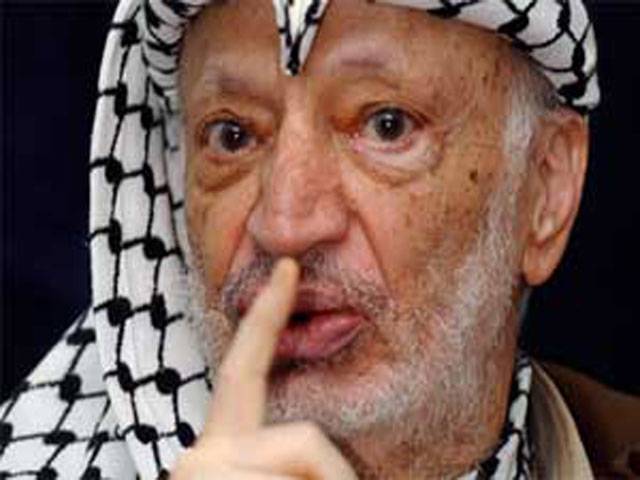RAMALLAH (AFP) - The remains of iconic Palestinian leader Yasser Arafat were exhumed on Tuesday, eight years after his death, with experts set to test for signs that he was poisoned.
The process was carried out in secrecy, with Arafat’s grave carefully shielded from the public eye and media kept far away, but Palestinian sources confirmed samples had been taken from the remains on Tuesday morning.
“At 5:00 am (0300 GMT), experts began to remove the stones and began opening the grave in an orderly fashion,” a Palestinian source told AFP on condition of anonymity.
The source said that only a Palestinian doctor had been allowed to directly touch the remains and remove the samples, but that the process was conducted in front of Swiss, Russian and French experts.
Palestinian officials had originally planned a military ceremony to accompany the reburial, but a source told AFP that the samples were collected from the remains without removing them from the grave, so no reburial was necessary.
“The samples were taken from Arafat’s remains from inside the grave and the samples were then transferred to the mosque,” the Palestinian source said, referring to a building adjacent to the Muqataa presidential complex in Ramallah, from which Arafat once ruled.
Tawfiq Tirawi, head of the Palestinian commission investigating Arafat’s death, said in a statement that a “joint decision” had been taken by the various experts involved to collect the samples from within the grave, which was subsequently resealed.
For weeks, Arafat’s grave in a mausoleum on the Muqataa presidential site from which he once governed had been hidden from view by blue tarpaulins, which were torn down after the process was completed on Tuesday morning.
The samples collected are to be tested for the radioactive substance polonium as part of a new investigation into whether Arafat was poisoned.
The probe was prompted by an investigation carried out by the Al-Jazeera news channel, which commissioned a Swiss lab to test personal effects belonging to the late leader that were given to them by his widow Suha.
The tests revealed the presence of the toxic substance polonium, and prompted calls for the exhumation of Arafat’s remains for new testing.
Polonium was the substance that killed Russian ex-spy and fierce Kremlin critic Alexander Litvinenko in London in 2006.
France opened a formal murder inquiry into Arafat’s death in late August at Suha’s request, and French judges in charge of the investigation arrived in Ramallah on Sunday to participate in the exhumation process.
Rumours and speculation have surrounded Arafat’s death ever since the quick deterioration of his health before he died at the Percy military hospital near Paris in November 2004 at the age of 75.
Doctors were unable at the time to say what killed the Palestinians’ first democratically-elected president and an autopsy was never performed, at his widow’s request.
But many Palestinians believed he was poisoned by Israel - a theory that gained ground in July following the Al-Jazeera report.
The samples taken Tuesday will be flown to laboratories in the three countries involved, with results expected within several months.
Some experts, however, have questioned whether anything conclusive will be found because polonium has a short half-life.
Jean-Rene Jourdain, deputy head of human protection at the French Institute for Radiological Protection and Nuclear Safety (IRSN), said it would take weeks of analysis to be sure that the traces were man-made polonium rather than just coincidental contamination by naturally-occurring polonium.
“Even if traces of polonium are found, it doesn’t mean that they are man-made,” he told AFP.
Israel has denied any involvement in Arafat’s death and dismissed the probe as irrelevant.
The process was also opposed by some members of Arafat’s family, notably his nephew Nasser al-Qidwa, who has said the process would desecrate the grave and was unlikely to reveal new information. Meanwhile, the Palestinian leadership is to petition the International Criminal Court in The Hague if it finds proof that the late Yasser Arafat was poisoned, an official said Tuesday.
“If it is proved that Arafat was poisoned, we will go to the international court,” said Tawfiq Tirawi, head of the Palestinian commission investigating Arafat’s death, referring to the International Criminal Court (ICC).
His remarks were made at a press conference which took place several hours after the veteran leader’s remains were exhumed for testing by a team of international experts.
Thursday, April 18, 2024
Arafat’s remains exhumed as probe begins

Tobacco usage declines after decision on high taxes
April 18, 2024
Enemies of Pakistan are unable to digest investment in the country: Ataullah Tarar
1:29 PM | April 18, 2024
IHC restores Bushra Bibi's appeal for shifting to Adiala Jail from Bani Gala
1:24 PM | April 18, 2024
Hepatitis Challenge
April 18, 2024
IMF Predictions
April 18, 2024
Wheat War
April 18, 2024
Rail Revival
April 17, 2024
Addressing Climate Change
April 17, 2024
Justice denied
April 18, 2024
AI dilemmas unveiled
April 18, 2024
Tax tangle
April 18, 2024
Workforce inequality
April 17, 2024
New partnerships
April 17, 2024
ePaper - Nawaiwaqt
Advertisement
Nawaiwaqt Group | Copyright © 2024





